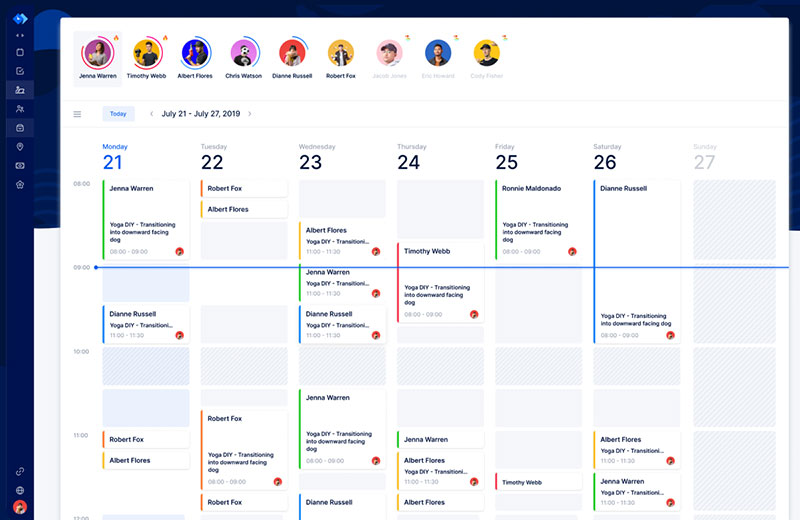Are you ready to break free from the constraints of a traditional nine-to-five job, take control of your career, and unlock your full potential? Becoming an independent consultant could be the career you’ve been searching for. But, you need to be well-informed before you make that jump and submit your resignation letter.
In this article, we will explore the numerous benefits of working as an independent consultant. Then, we will walk you through the essential steps and strategies to launch a thriving consulting business. Lastly, we will talk about what tools you can take advantage of to effectively manage your time and resources.
So, let’s dive in and uncover the secrets of how to become an independent consultant, a career choice that puts you in the driver’s seat of your professional future.
Who Are Independent Consultants?
By definition, an independent consultant is a self-employed professional who offers expert advice and guidance to businesses and organizations within their specific field of expertise. As a consultant, you operate independently rather than as an employee of a company, allowing you to have more control over your work and flexibility in your schedule.
As an independent consultant, this is what is expected of you:
- Identifying clients’ needs and challenges
- Developing tailored solutions to address identified issues
- Offering expert advice based on industry knowledge and experience
- Implementing effective strategies and processes
- Evaluating the success of implemented solutions
- Adapting to the unique needs of each client and project
- Continuously expanding knowledge and expertise in your chosen field
Now that we have a clear understanding of what is an independent consultant, let’s consider the steps of how to become one.
Define Your Niche
The first step in becoming an independent consultant is identifying your unique value proposition. You want to be an expert and not a generalist. By focusing on a specific area of industry expertise, you can set yourself apart from the competition and cater to a more targeted client base.
Assessing your skills, experience, and passion
Evaluate your current skillset and experiences to determine which area of expertise your consulting business is best suited for. Consider your professional background, strengths, and interests. Your passion for the subject matter will make your work more enjoyable, and it will shine through to your future clients.
When assessing your skills and experiences, consider any certifications or specialized training you have received. Highlighting these qualifications can strengthen your credibility and increase your chances of attracting high-paying clients. It’s essential to keep up your learning and acquire new skills to stay ahead of your competition and provide the best service possible to your clients.
Analyzing the competition and finding gaps in the market
Next, research existing independent consultants and consulting firms in your chosen niche. Your goal is to identify any gaps or underserved segments in the market that you could potentially fill. This will help you develop a unique selling proposition, making you more attractive to potential clients.
When analyzing your competition, examine their marketing materials, online presence, and client reviews. This will help you understand what works well and areas where you could offer something different or improved. Don’t forget to emphasize your unique perspective or methodology in marketing efforts to set yourself apart from the competition.
Develop a Comprehensive Business Plan
Creating a business plan is crucial for setting the foundation of your independent consulting business. A well-structured plan will outline your goals, target market, and strategies for growth. It also serves as a valuable reference tool to track your progress and make informed decisions about the direction of your business.
Here are the steps when developing a business plan.
Setting goals and objectives
Establish clear, achievable professional goals for your consulting business. These goals should focus on both short-term milestones and long-term growth. Consider your desired income, the number of clients, and the projects you want to work on.
When setting your goals, remember to use the SMART criteria: Specific, Measurable, Achievable, Relevant, and Time-bound. Following these guidelines ensures that your goals are well-defined and provide a clear path to success.
Outlining target market and ideal clients
Identify your target market and ideal client profile. Consider their industry, company size, and specific pain points your services can address. By defining your target audience, you can develop more effective marketing strategies to reach them.
Create detailed buyer personas for your ideal clients, outlining their demographics, goals, and challenges. This will help you craft targeted messaging and content that resonates with your audience and position you as your field’s go-to expert.
Crafting a roadmap for growth and success

Develop a detailed action plan that outlines the steps you will take to achieve your goals. This roadmap should include marketing strategies, networking efforts, and continuous learning opportunities to stay up-to-date with the latest trends in your niche. Break down your goals into actionable tasks and set deadlines for each task to ensure you stay on track and maintain momentum.
Include a financial plan in your roadmap that covers your expected income, expenses, and cash flow. This will help you understand the financial impact of your decisions and make informed choices as you grow your consulting business.
Determining how much to charge for your service
You don’t want to undercharge or overcharge your service. Determining your price is a vital part of developing your business plan. Do your homework and research industry standards to ensure your service price is competitive.
Consultants working independently or as freelance providers usually offer multiple payment options, such as by project, hourly, or retainer payments. Some people are comfortable with paying hourly rates. Similarly, many people prefer to pay per project; perhaps this can help them avoid mediocre consulting.
So, you can decide based on the type of project or service how to charge your client. According to Salary.com, the average yearly salary in California for an independent consultant is $95,200 as of May 2023. Due to many factors, you will notice that the average is between $83,497 and $106,945.
Setting Up Your Business
Embarking on the journey of an independent consultant calls for establishing a solid foundation for your business. In this section, we’ll delve into the legal aspects of setting up your company, tax considerations, and other vital elements to ensure your consulting venture starts smoothly.
Choosing the right business structure

First and foremost, select a suitable business structure for your consulting firm. There are several options to consider, each with its benefits and drawbacks.
- Sole Proprietorship. A simple, cost-effective option for those starting out on their own. You and your business are considered one entity, simplifying taxes but exposing you to personal liability for business debts and obligations. For instance, if your consulting business faces financial difficulties, your assets could be at risk.
- Limited Liability Company (LLC). This structure provides a degree of liability protection, separating your assets from your business liabilities. LLCs offer pass-through taxation, meaning the company’s income is only taxed once, at the individual level. This can benefit high-income consultants, as it helps avoid double taxation.
- S Corporation. Like an LLC, an S Corporation also provides liability protection and pass-through taxation. However, this structure has more stringent requirements and may be subject to additional regulations, such as shareholder limitations and strict profit distribution rules.
Consult a legal or tax professional to determine the most appropriate structure for your needs and circumstances.
Registering your business and acquiring the necessary permits
Once you’ve chosen a business structure, register your company with the appropriate government authorities. This process typically involves selecting a unique business name, filing necessary paperwork (such as articles of organization for an LLC), and paying any associated fees.
Depending on your location and the nature of your consulting services, you may also need to obtain specific licenses or permits. Research your local and industry requirements to ensure your business fully complies with all applicable regulations. For example, some cities may require a home-based business permit if you plan to operate your consulting firm from your residence.
Managing taxes and financial obligations
As an independent consultant, you’ll manage your own taxes and financial obligations. Set aside a portion of your income to cover estimated tax payments, which may be due quarterly for self-employed individuals. Keep accurate records of your income and expenses to simplify tax filing and ensure compliance.
Consider consulting a tax professional to help navigate the complexities of self-employment taxes and maximize deductions. They can provide valuable guidance on tax planning and strategies to minimize tax liability. Standard tax deductions for independent consultants include home office expenses, business travel, and professional development costs.
Establishing a separate business bank account
Opening a separate business bank account is necessary to maintain a clear distinction between your personal and business finances. This separation simplifies accounting and tax preparation and demonstrates professionalism and credibility to your clients.
Shop around for a bank that offers favorable terms and services tailored to small business owners. Look for low or no fees, easy online access, and dedicated support for business customers. When comparing different accounts, consider additional services like merchant services for processing client payments or the availability of credit lines for potential future needs.
Securing adequate insurance coverage
Protect your consulting business with the appropriate insurance coverage. This may include professional liability insurance (errors and omissions insurance), which safeguards against claims of negligence, mistakes, or inadequate work.
Additionally, consider general liability insurance to protect against claims of bodily injury or property damage, and if you have employees, workers’ compensation insurance may be required by law. Depending on your specific needs and circumstances, other types of insurance to consider include business interruption insurance, which covers lost income and additional expenses in the event of a temporary business closure, and cyber insurance to protect against potential losses from data breaches or cyberattacks.
Investing time and effort in setting up your business correctly will pay dividends in the long run. By addressing legal, tax, and financial aspects from the outset, you’ll be well-positioned to focus on delivering exceptional consulting services and confidently growing your venture. As you navigate the complexities of launching your consulting business, always remember that seeking expert advice from legal, tax, and financial professionals can be invaluable in ensuring your success.
Establish Your Personal Brand
As an independent consultant, your personal brand is vital in building credibility and attracting new clients. A strong brand will showcase your expertise and make you stand out from the competition.
Creating a professional logo and visual identity
Design a logo and visual identity that reflects your unique value proposition and your services. This will help create a cohesive and recognizable brand image across all your marketing materials. Consider hiring a professional graphic designer to create a polished and professional logo that accurately represents your brand.
When developing your visual identity, consider color schemes, typography, and imagery that will resonate with your target audience and convey the essence of your brand. Consistency is key – ensure that your visual identity is applied uniformly across all channels and touchpoints.
Developing a consistent online presence
Establish a robust online presence through a professional website, LinkedIn profile, and relevant social media platforms. These channels should consistently showcase your expertise, services, and personal brand.
Your website should be user-friendly, mobile responsive, and search engine optimized to ensure it ranks well in search results. A well-optimized website increases your visibility, drives organic traffic, and establishes you as an authority in your niche.
Showcasing your expertise through a personal website and social media
Your website should include a portfolio of your past work, client testimonials, and a blog where you can share industry insights and valuable content. Regularly engage with your audience on social media by sharing helpful tips, industry news, and updates about your consulting projects.
Offering valuable content establishes your credibility and helps build trust with your audience. Consider guest posting on reputable industry websites or collaborating with other professionals to reach a wider audience and grow your online presence.
Network and Build Relationships
Networking is essential for finding new clients and establishing a successful independent consulting business. Building relationships with industry professionals can lead to valuable connections and opportunities.
Engaging in industry events and conferences
Attend industry events, conferences, and workshops to meet and connect with professionals in your niche. These gatherings provide:
- An excellent platform for exchanging ideas
- Opportunity to learn about the latest trends
- A chance to make a lasting impression on potential clients
Prepare an engaging elevator pitch that briefly conveys your value proposition and sparks interest in your services. Develop a set of high-quality business cards to hand out during networking events, ensuring potential clients have a tangible reminder of your brand and contact information.
Participating in online forums and social media groups
Join online forums, social media groups, and LinkedIn communities related to your niche. Engage with members by offering expert advice, answering questions, and sharing valuable content. Building credibility within these communities can lead to new client inquiries and referrals.
When participating in these online platforms, be genuine and authentic. Avoid overly promotional content and focus on providing valuable and helpful information. This approach will help you build trust and a positive reputation within the community.
Cultivating relationships with potential clients and other consultants
Develop long-term relationships with potential clients and fellow independent consultants. As you grow your business, these connections can lead to collaborations, referrals, and a strong support network. Make an effort to maintain regular contact with your connections through email, social media, or in-person meetings. Show genuine interest in their success and offer assistance whenever possible.
Offering value without expecting anything in return will help solidify your relationships and demonstrate your commitment to mutual success. As you nurture these relationships, you’ll find that opportunities for collaboration and referrals will naturally arise.
Develop a Targeted Marketing Strategy
Now that you are set up, time to market yourself. This calls for a targeted and effective marketing strategy. An effective marketing strategy is crucial for reaching your target audience and promoting your consulting business.
Identifying the most effective marketing channels
Determine which marketing channels are best suited for reaching your target audience. This could include content marketing, email marketing, social media, public relations, or paid advertising. Test different channels to find the most effective combination for your business.
When selecting marketing channels, consider your audience’s preferences, habits, and the platforms they are most active on. By aligning your marketing efforts with your target audience’s behavior, you increase the likelihood of capturing their attention and generating leads.
Crafting compelling content for your audience
Create high-quality, engaging content that showcases your expertise and provides value to your audience. Share informative blog posts, case studies, whitepapers, or video tutorials demonstrating your knowledge and the benefits of working with you as an independent consultant.
When developing content, focus on addressing the pain points and challenges your target audience faces. Offer actionable solutions and insights that help them overcome these obstacles, positioning yourself as a valuable resource and thought leader in your niche.
Measuring the success of your marketing efforts
Monitor the performance of your marketing campaigns and adjust your strategies as needed. Track key performance indicators (KPIs) such as website traffic, social media engagement, and lead generation to evaluate the effectiveness of your efforts.
By regularly reviewing your marketing performance, you can identify areas for improvement and optimize your strategies for maximum impact. This data-driven approach ensures that your marketing efforts align with your business objectives and deliver the best possible results.
Invest in professional development for continuous learning
If you want to stay apart from the competition, staying updated with industry movements and top-notch strategies is key. Let’s explore some reliable online destinations to keep learning.
- Harvard Business Review. Think of this as your library for business wisdom. It’s packed with articles, studies, and advice on subjects like consulting, running a business, and being a great leader.
- Small Business Administration. Picture this as your helpful government friend, offering tools and info for small businesses, including guidance on launching and running your consulting venture.
- Forbes. Imagine this as your business newsstand, bringing you stories about entrepreneurship, consulting, and career growth, and featuring articles from the pros and trailblazers. Be ready to filter out a lot of useless content, though.
- Institute of Management Consultants USA. This is like a club for management consultants, giving you access to resources and training, and giving you the chance to connect with other consultants.
- Consulting Success. Think of this as your one-stop shop for everything consulting, offering articles, podcasts, and courses covering a wide range of topics.
Investing in Tools and Technology for Automation
In the consulting world, time is of the essence. Every moment counts, and that’s where automation comes in.
Automation helps consultants save time, work more efficiently, and ultimately perform better for their clients.
Trafft, the business consulting software that simplifies appointment booking and client management, is one such tool designed to make a consultant’s life easier.

Why choose Trafft?
Let us break it down for you:
- Unbeatable calendar management: Take full control of your schedule with Trafft’s intuitive calendar, easily juggling appointments, meetings, and events like a pro.
- Customization on point: Make your booking experience a reflection of your brand. With Trafft, you get to personalize the look and feel of your booking page, creating a unique experience for your clients.
- Client communication, handled: Automated reminders make sure your clients show up on time, every time. And with 24/7 online booking, they can schedule appointments whenever inspiration strikes. No more email tagging!
- Integrated payments: Trafft allows you to accept payments right from the booking page, streamlining the whole process. Say goodbye to chasing invoices.
- Data-driven insights: Track your performance and make data-backed decisions with Trafft’s built-in analytics. Knowledge is power, after all.
Running a consulting business is much easier with Trafft. And we’re not the only ones who think so – countless independent consultants just like you have experienced the Trafft difference.
Don’t just take our word for it, though. Give Trafft a try and see the magic for yourself. We’re confident you’ll love it as much as we do.
Picture this: less time spent on admin tasks, more time spent on growing your consulting business and doing what you love. It’s a win-win!
Ready to revolutionize your consulting business? Join the Trafft family today and say hello to a new world of seamless scheduling and automation. Trust us, you won’t look back.
Unleashing productivity and enhancing expertise
With Trafft as your ally, you can focus on providing top-notch service, making the most of your expertise. The software is designed to increase productivity by up to 75%.
This extra time allows consultants to concentrate on honing their skills, delivering exceptional value to their clients, and growing their businesses.
Trafft provides a seamless and efficient booking process that clients will surely appreciate.
The streamlined experience keeps clients satisfied and encourages them to return for future consultations. For consultants, this means better client retention and a growing clientele.
Additionally, Trafft’s easy-to-use interface makes it accessible for consultants who are just starting out as well as for experienced professionals seeking to improve their workflow.
The software’s versatility caters to both independent consultants and large consulting firms.
Trafft is an indispensable tool for anyone looking to excel in consulting. Automating and streamlining tasks creates a better experience for both consultants and clients. With the power of Trafft, there is no more inefficient manual appointment scheduling, as everything is streamlined.
Manage Your Time and Resources Effectively

As an independent consultant, mastering time management and resource allocation are vital to success. You want to “work smarter instead of harder.” With proper strategies to manage your time and resources, you will thrive as an independent consultant.
Balancing client work and business development
Allocate time for client work and business development tasks, such as marketing, networking, and acquiring new skills. Striking the right balance is essential for maintaining a steady stream of clients and growing your business.
Develop a daily or weekly schedule that outlines your tasks and priorities. This will help you stay organized and focused on your most important activities. Use productivity tools and techniques, such as the Pomodoro Technique or time-blocking, to manage your workload effectively.
Setting boundaries and creating a work-life balance
Establish boundaries between your work and personal life to avoid burnout and maintain a healthy work-life balance. Set working hours, take breaks, and make time for self-care and personal interests.
Communicate your boundaries and availability to your clients, ensuring they understand and respect your work-life balance. Establishing these expectations early on will help prevent misunderstandings and provide a positive working relationship.
FAQ On Becoming An Independent Consultant
How do I start my journey as an independent consultant?
Oh, it’s an exciting time for sure! First things first, you’ll want to identify your niche – your specific area of expertise. Are you into finances and tax laws? Or are you more interested in business process automation? Once you decide on a perfect niche for you, get your business plan together. This plan should include things like your target market, services, pricing, and marketing strategies.
Don’t forget to set up your legal structure (sole proprietor, LLC, etc.), and secure any required licenses or permits. Finally, network, network, network – it’s the lifeblood of any successful consulting business!
Is it necessary to have a formal education or certification?
Good question! While it’s not always a requirement, having a formal education or certification can definitely give you a competitive edge. It shows potential clients that you’re committed to your field and have the knowledge and skills to back it up.
It’s worth looking into certifications specific to your industry or niche, as well as joining professional associations to enhance your credibility.
How do I set my fees and pricing?
Ah, the million-dollar question!
To set your fees, first research what other consultants in your field are charging. You can do this through industry-specific publications, websites, or networking groups. Consider factors like your experience, certifications, and location. Also, decide on a pricing structure: hourly, project-based, or retainer.
Be prepared to adjust your pricing as you gain more experience and become more established.
How do I market myself and find clients?
Let’s get you out there! Building your personal brand is essential for attracting clients. Create a professional website showcasing your expertise, skills, and past projects.
Utilize social media and blogging to establish yourself as an industry thought leader. Attend industry events and join professional associations to build your network. Don’t forget the power of referrals – always ask satisfied clients to spread the word!
Should I create a contract for my consulting services?
Absolutely! A well-crafted contract is essential to protect both you and your client. It should include the scope of work, deliverables, deadlines, payment terms, and any other relevant details.
This will help set expectations and ensure everyone is on the same page. It’s a good idea to consult with a lawyer to make sure your contract is legally sound.
Do I need business insurance?
Better safe than sorry! As an independent consultant, it’s a good idea to have business insurance.
This can include professional liability insurance (also known as errors and omissions insurance), which protects you against claims of negligence, and general liability insurance, which covers bodily injury and property damage claims.
Speak with an insurance agent to determine the best coverage for your specific consulting business.
How do I handle taxes as an independent consultant?
Taxes, oh joy! As an independent consultant, you’ll typically be responsible for paying self-employment taxes, which cover Social Security and Medicare.
You may also need to pay estimated taxes quarterly. Keep track of all business-related expenses, as these can help reduce your taxable income. It’s a good idea to consult with a tax professional to ensure you’re compliant with all tax laws and are taking advantage of any deductions.
Should I offer a guarantee for my services?
Tricky territory! While guarantees can be a selling point for some clients, they can also be risky. Instead of offering a blanket guarantee, consider offering satisfaction guarantees, where you promise to work with the client to address any concerns or issues until they’re satisfied.
This demonstrates your commitment to your work without over-promising results that may be outside of your control.
How do I manage my time effectively?
Time is money! As an independent consultant, you’ll need to become a master of time management. Set clear boundaries between work and personal time, and use tools like calendars, task lists, and time-tracking apps to stay organized. Break down larger projects into smaller tasks with deadlines, and prioritize your to-do list based on importance and urgency.
Don’t forget to schedule regular breaks and downtime – burnout won’t help your productivity! Consider outsourcing administrative tasks or using automation tools to free up more time for the work that really matters.
Key Takeaways
Becoming a successful independent consultant takes dedication, persistence, and a willingness to adapt and learn. You’ll be well on your way to launching and growing your consulting business by following these steps:
- Define your niche and unique value proposition.
- Develop a comprehensive business plan.
- Establish your personal brand and online presence.
- Network and build relationships with industry professionals and potential clients.
- Develop a targeted marketing strategy.
- Invest in tools for automation.
- Manage your time and resources effectively.
Several minutes ago, when you were thinking of how to become an independent consultant, you may have felt overwhelmed. But after reading about what’s involved, hopefully, you have a better idea of how to get started. Granted, becoming a successful independent consultant requires continuous learning, adapting to industry changes, and staying ahead of the competition. There are definitely pros and cons to be considered.
If you decide that consulting is your passion, then start now, and do it right. By following the right strategies, continuing to hone your skills, and always striving for excellence in your work, you’ll build a thriving consulting business. You will enjoy the many benefits that self-employment offers, including the freedom to set your schedule, pursue your passions, and make a meaningful impact in your chosen industry.
Ready to Dive in for More Fun?
Check out these extra resources to uncover all the details about the consulting business:
- How to Start an Online Consulting Business: The Complete Guide
- How to Get Clients as a Consultant
- How to Run a Consulting Business & Be Successful
- How to Promote Your Consulting Business? From A-Z
- The Most Effective Marketing Strategies for Consultants
- The Ultimate Guide to Writing a Consulting Business Plan
- How to Start a Marketing Consulting Business



